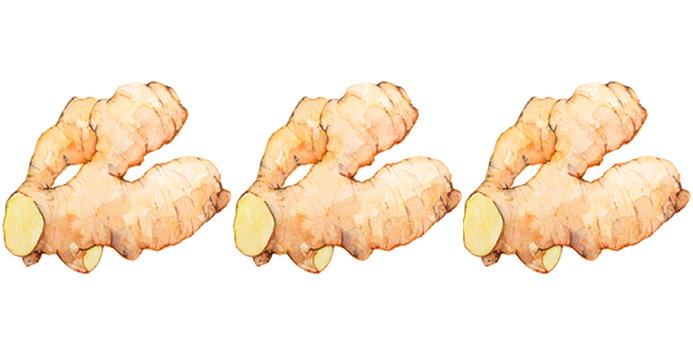Ginger does a whole lot more than just give your stir-fry amazing flavor. Although you probably don’t need any more reasons to love ginger, check out how powerful this flavorful little root can be.
Ginger is related to turmeric. Ginger is a root, more specifically a rhizome, with the scientific name of Zingiber officinale. It belongs to the Zingiberaceae family along with other anti-inflammatory plants including cardamom, turmeric, and galangal.
Ginger was originally cultivated for medicinal purposes. Ginger has been around for over 5,000 years and was originally grown in China and India because it was believed to have potent medicinal properties. India still produces more ginger than any other nation in the world. Ginger has been used in the culinary world for around 4,400 years.
Ginger’s spice and warmth comes from ketones. Ginger has that signature aroma and taste often described as warm and slightly spicy but not hot. This unmistakable flavor comes from its ketones—in particular—the ketone gingerol. Gingerol is actually very similar to piperine (the compound that gives black pepper its heat) and capsaicin (the compound that provides heat in chili peppers). As ginger is heated during the cooking process, a chemical reaction takes place and gingerol transforms into zingerone, which is more mellow and sweet.
Ginger is a potent anti-inflammatory. Concentrated ginger extract has been shown in numerous studies to reduce inflammation, which is associated with a host of chronic health problems, including cancer and heart disease.
Ginger nixes nausea. People who suffer from nausea frequently, such as patients receiving chemotherapy, travelers combating motion sickness when on the high seas, or pregnant women subjected to annoying morning sickness, reach for a drug-free remedy and give ginger a whirl. Some studies have shown that its active component 6-gingerol may aid in nausea relief because it relaxes your gastrointestinal muscles.
Ginger can help with muscle soreness and pain associated with exercise. Studies have demonstrated that ginger eases day to day muscle pain that progresses, especially as you increase your exercise frequency or intensity.
Ginger helps ease symptoms of osteoarthritis. Osteoarthritis, a degenerative joint disease that the Centers for Disease Control and Prevention (CDC) says affects 27 million people in the U.S., causes stiffness and pain in the joints. A recent controlled trial that included 247 individuals found that those who had taken a ginger extract experienced less pain and did not need as much medication.
Ginger may help lower your blood sugar and reduce your heart disease risk. The research around ginger’s possible benefits regarding diabetes and heart disease is still in its infancy, but early studies show promise. A 2015 study of type 2 diabetics ascertained that a 2-gram daily dose of ginger powder lowered their fasting blood glucose levels by a whopping 12%. These diabetics also enjoyed a 10% reduction in their hemoglobin A1c readings—a test that shows your average blood sugar over 12 weeks. Additionally, these diabetics also saw significant reductions in heart disease risk factors.
Got heartburn or indigestion? Ginger may help! Delayed gastric emptying is believed to contribute to dyspepsia. Research has unearthed ginger’s ability to speed up the emptying of your stomach (some showing increasing gastric emptying time by nearly 50 percent), thus helping relieve painful indigestion.
Ginger can lower bad cholesterol, total cholesterol, and triglycerides. Both animal and human studies have revealed that ginger can lower your LDL cholesterol (“bad” cholesterol), total cholesterol, and triglycerides—high levels of these are associated with heart disease.
Ginger can help keep your brain healthy. Research continues to demonstrate that the antioxidants and other phytochemicals in ginger can stymie oxidative stress and inflammation that can lead to age-related cognitive decline and Alzheimer’s disease. Several studies have actually shown that ginger can directly boost your brain function by enhancing your reaction time and bolster working memory.
[Image via Shutterstock]



